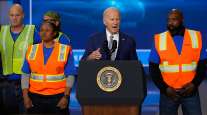Construction Stocks Tank as Trump’s Infrastructure Plans Fizzle

The predicted boom in construction stocks under President Donald Trump is turning into a bust.
Trump promised to deliver a $1 trillion infrastructure early in his first year but is now talking about trying to get one through Congress by year-end, with concern it may be pushed into 2018. Waning optimism is taking a toll on builders such as Fluor Corp. and Chicago Bridge & Iron Co., which already have been hit by cost overruns on major projects.
“Clearly we had a pop in all these names with the election,” said Brent Thielman, a construction industry analyst with D.A. Davidson & Co. “As investors are digesting that this is going to take more time — if it happens at all — we’re sort of back to the reality of the market.”
Trump abandoned a plan for an infrastructure advisory group this month in the wake of his controversial comments on the violence in Charlottesville, Virginia. While top economic adviser Gary Cohn said the administration still hopes to get an infrastructure plan approved this year, Congress must first tackle the debt ceiling and an as-yet-unwritten tax bill before turning its attention to America’s crumbling roads and bridges.
“Delivering U.S. infrastructure projects will be challenging,” said Sonia Baldeira, an analyst at Bloomberg Intelligence, after Trump scrapped plans for the council.
Stock prices for all 18 of the largest U.S. engineering and construction firms increased in the weeks following Trump’s surprise win in November, driven by investor expectations of an infrastructure boom and tax cuts. From Nov. 8 through the end of 2016, Fluor jumped 18% and CBI climbed 13%. Since Jan. 1, however, shares of Fluor and CBI have fallen 28% and 65%, respectively.
During the energy boom in 2014, Fluor, the largest publicly traded construction company by revenue, and CBI signed fixed-priced contracts to build electricity, petrochemical and natural gas processing plants. Now, they’re finding that payments aren’t covering expenses inflated by snags on equipment, worker productivity and poor original estimates. Fixed-price contracts have higher profit potential for the builder but carry more risk than cost-reimbursable projects.
“You have highly visible fixed-price contract charges taken by many companies, primarily CBI and Fluor,” said Mike Dudas, an analyst with Vertical Research Partners. “That certainly has given a negative connotation to the group in general.”
Spending Slows
Non-residential construction spending increased 0.6% in the first six months of this year compared with a year ago, held back by a 5.4% drop in public spending, according to Commerce Department data. Total spending for manufacturing facilities, power plants, highways, water and waste-water projects have dropped this year. A few bright spots are gains of more than 10% for office and commercial construction.
Energy construction boomed in 2013 and 2014 as oil prices rose above $100 a barrel, which increased capital spending to drill. Also, drilling techniques that unlocked vast natural-gas deposits in shale fields made the fuel abundant and cheap, spurring investment in petrochemical plants along the U.S Gulf Coast.
Irving, Texas-based Fluor — which gets about half its revenue from its energy, chemicals and mining unit — took a $124 million writedown in August following charges of $30 million in the first quarter and $265 million last year related to struggles with gas-fired power plants and a petrochemical facility.
CBI, which is based in the Netherlands but run from a Houston suburb, plans to sell its technology unit to plug a financial hole after a $548 million writedown in the second quarter. The charges stem from problems on two liquid natural gas processors and two gas-fired power plants.
Fluor said in emailed response to questions that it’s carefully evaluating how it bids for future power work and that the company makes a profit on the “overwhelming majority” of its fixed-price contracts. A CBI spokeswoman declined to comment.
Bargain Hunters
Even construction stocks with less work tied to the oil-and-gas industry have declined this year. Jacobs Engineering Group is down 11% in 2017, while AECOM, the second-largest publicly traded construction company, has fallen 14%.
For some investors, there may be buying opportunities: Fluor and CBI are cheap. The stocks this month have dropped to levels not seen in the past decade except for only a few months at the end of 2008 and beginning of 2009, in the throes of the recession. Still, the companies will have to prove they’ve stemmed the writedowns on projects to regain Wall Street’s confidence.
With natural gas from U.S. shale fields still abundant and cheap, there will be another round of projects for power, petrochemical and liquefied natural gas, said Andrew Wittmann, an analyst with Robert W. Baird & Co. It could take a year or longer for that to happen, he said. When it does, companies will have to be more careful when they bid on those projects.
“Public companies are always looking for growth and they want to win awards,” Wittmann said. “There’s enough competition out there that I don’t think the fixed-price contract is going away.”
With assistance by Mark Niquette




